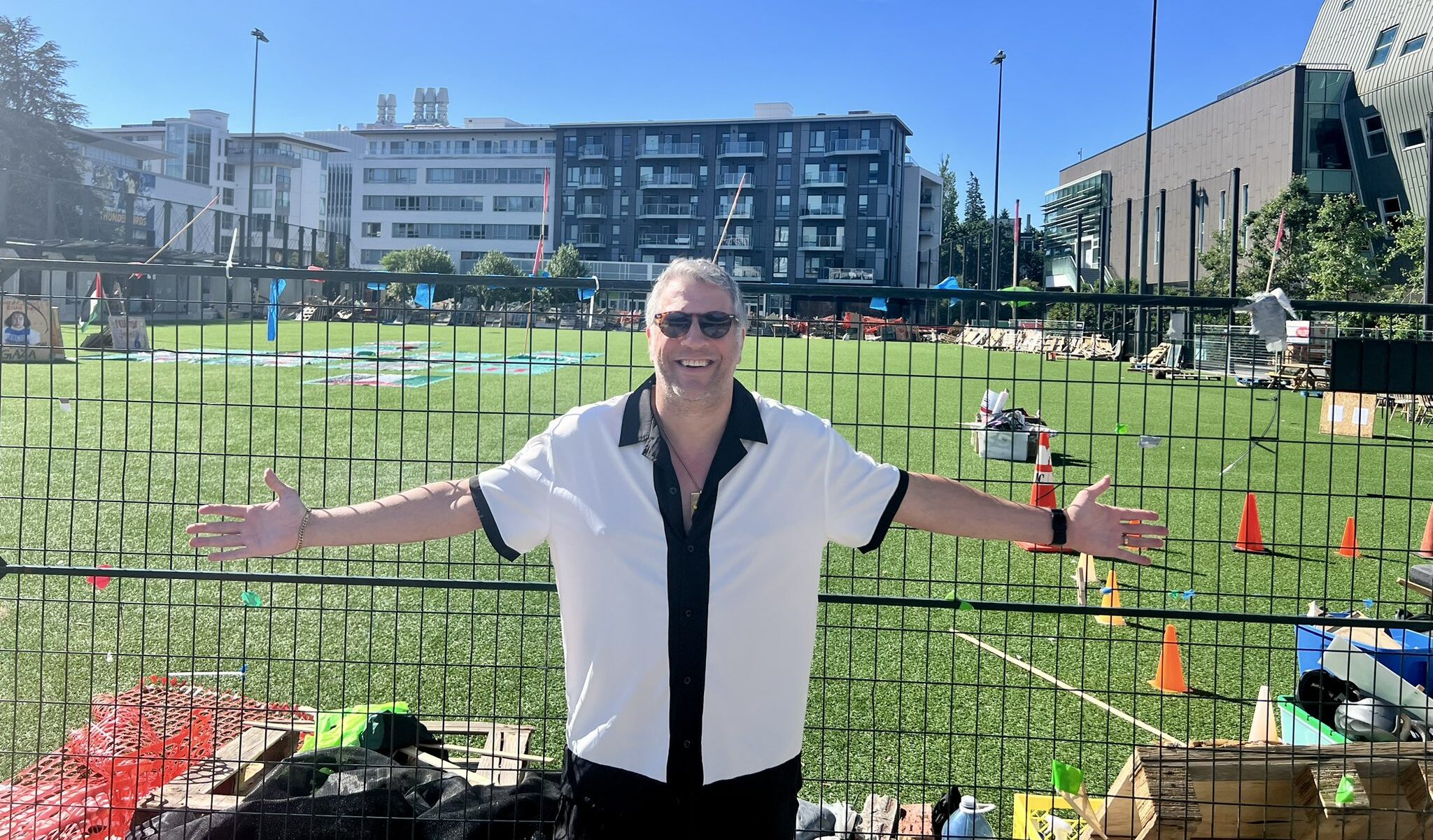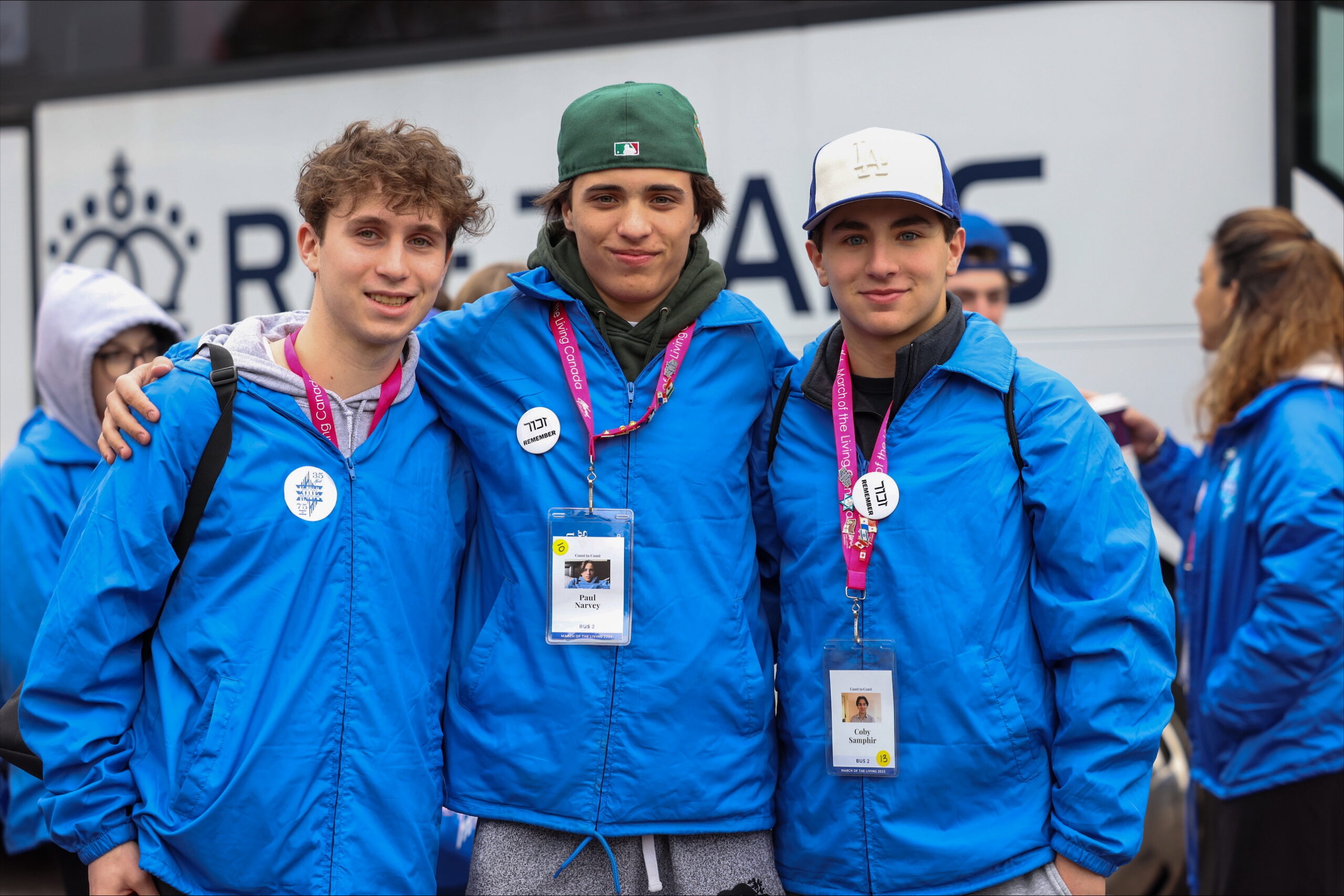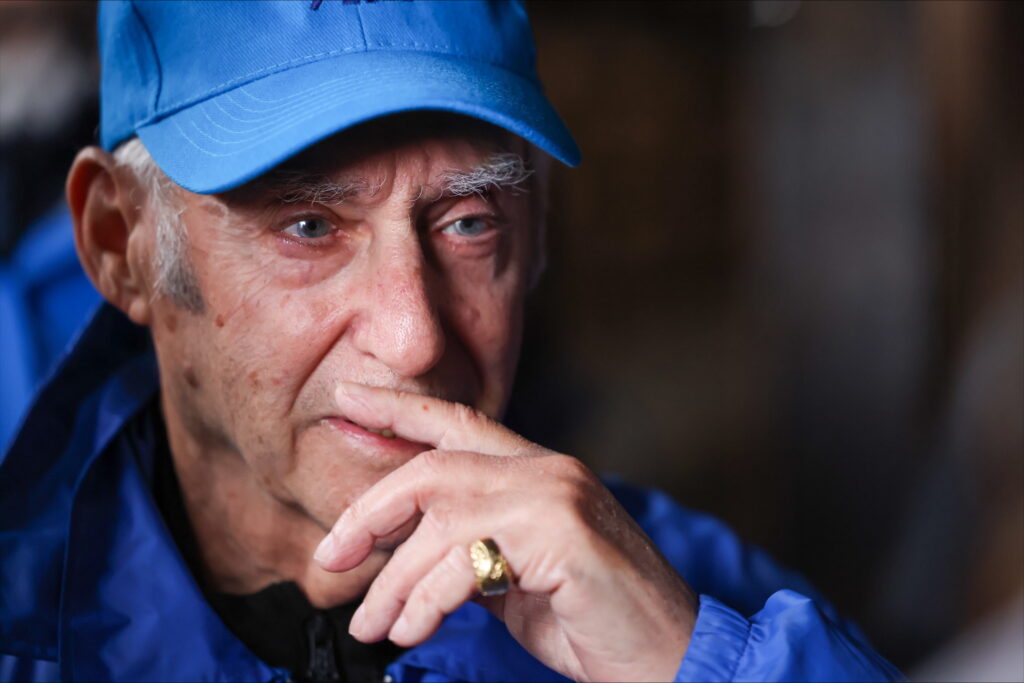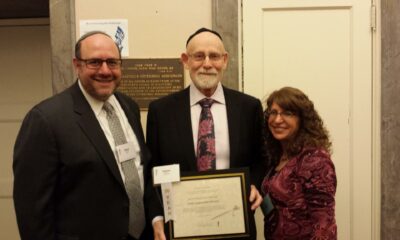Local News
Palestinian campus encampments dismantled across Canada—whether voluntarily or by authorities

By SAM MARGOLIS (Canadian Jewish News) Several encampments which have occupied Canadian universities since April have been dismantled, a week after an Ontario Supreme Court granted the University of Toronto an injunction to remove a pro-Palestinian tent protest from its downtown campus.
At McGill, the Montreal campus was closed for the day from the early hours of June 10 while police and a private security firm removed protesters.
“McGill will always support the right to free expression and assembly, within the bounds of the laws and policies that keep us all safe. However, recent events go far beyond peaceful protest, and have inhibited the respectful exchange of views and ideas that is so essential to the University’s mission and to our sense of community,” McGill president Deep Saini said in a news release.
“People linked to the camp have harassed our community members, engaged in antisemitic intimidation, damaged and destroyed McGill property, forcefully occupied a building, clashed with police, and committed acts of assault,” he said.
In Ottawa, protesters voluntarily removed their tents from the campus July 10, claiming that negotiations with the university administration had stalled.
Several encampments which have occupied Canadian universities since April have been dismantled, a week after an Ontario Supreme Court granted the University of Toronto an injunction to remove a pro-Palestinian tent protest from its downtown campus.
At McGill, the Montreal campus was closed for the day from the early hours of June 10 while police and a private security firm removed protesters.
“McGill will always support the right to free expression and assembly, within the bounds of the laws and policies that keep us all safe. However, recent events go far beyond peaceful protest, and have inhibited the respectful exchange of views and ideas that is so essential to the University’s mission and to our sense of community,” McGill president Deep Saini said in a news release.
“People linked to the camp have harassed our community members, engaged in antisemitic intimidation, damaged and destroyed McGill property, forcefully occupied a building, clashed with police, and committed acts of assault,” he said.
In Ottawa, protesters voluntarily removed their tents from the campus July 10, claiming that negotiations with the university administration had stalled.
“Every dollar you make off the blood of Palestinians will be lost as we continue to confront you, on this lawn and across campus this coming year, and the year after that, and every year until the complete liberation of Palestine, from the river to the sea,” protesters from Occupy Tabaret said on a post on Instagram.
An encampment at University of Waterloo was dismantled on July 7, in exchange for the university dropping a $1.5-million lawsuit and injunction proceedings.
A pro-Palestinian encampment at the University of British Columbia, which had maintained an inescapable presence at the Vancouver campus since the end of April, was voluntarily dismantled on the evening of July 7—and local Jewish groups are hoping this will provide a step towards easing fears among Jewish students and the community as a whole.
Several encampments which have occupied Canadian universities since April have been dismantled, a week after an Ontario Supreme Court granted the University of Toronto an injunction to remove a pro-Palestinian tent protest from its downtown campus.
At McGill, the Montreal campus was closed for the day from the early hours of June 10 while police and a private security firm removed protesters.
“McGill will always support the right to free expression and assembly, within the bounds of the laws and policies that keep us all safe. However, recent events go far beyond peaceful protest, and have inhibited the respectful exchange of views and ideas that is so essential to the University’s mission and to our sense of community,” McGill president Deep Saini said in a news release.
“People linked to the camp have harassed our community members, engaged in antisemitic intimidation, damaged and destroyed McGill property, forcefully occupied a building, clashed with police, and committed acts of assault,” he said.
In Ottawa, protesters voluntarily removed their tents from the campus July 10, claiming that negotiations with the university administration had stalled.
“Every dollar you make off the blood of Palestinians will be lost as we continue to confront you, on this lawn and across campus this coming year, and the year after that, and every year until the complete liberation of Palestine, from the river to the sea,” protesters from Occupy Tabaret said on a post on Instagram.
An encampment at University of Waterloo was dismantled on July 7, in exchange for the university dropping a $1.5-million lawsuit and injunction proceedings.
A pro-Palestinian encampment at the University of British Columbia, which had maintained an inescapable presence at the Vancouver campus since the end of April, was voluntarily dismantled on the evening of July 7—and local Jewish groups are hoping this will provide a step towards easing fears among Jewish students and the community as a whole.
The closure of the UBC Vancouver encampment took place a week after the Ontario Superior Court of Justice granted the University of Toronto an injunction to clear a pro-Palestinian encampment from its campus. The court ordered tents to be removed and gave police authority to arrest anyone who did not vacate the protest site.
“In our society, we have decided that the owner of property generally gets to decide what happens on the property,” Justice Markus Koehnen wrote in the July 2 ruling.
“If the protesters can take that power for themselves by seizing Front Campus, there is nothing to stop a stronger group from coming and taking the space over from the current protesters. That leads to chaos. Society needs an orderly way of addressing competing demands on space. The system we have agreed to is that the owner gets to decide how to use the space.”
Students at UofT voluntarily dismantled the encampment, which had numbered over 150 tents at some points, before the injunction deadline.
In Vancouver, Michael Sachs, the executive director of the Jewish National Fund Pacific, told The CJN, “There is a sense of relief that this is over, but also a sense of frustration with the amount of damage this has done, both to the Jewish community on campus and to the campus itself,”
Sachs went to UBC early Monday morning and took a photo of himself before the emptied encampment that he later posted on social media.
Several encampments which have occupied Canadian universities since April have been dismantled, a week after an Ontario Supreme Court granted the University of Toronto an injunction to remove a pro-Palestinian tent protest from its downtown campus.
At McGill, the Montreal campus was closed for the day from the early hours of June 10 while police and a private security firm removed protesters.
“McGill will always support the right to free expression and assembly, within the bounds of the laws and policies that keep us all safe. However, recent events go far beyond peaceful protest, and have inhibited the respectful exchange of views and ideas that is so essential to the University’s mission and to our sense of community,” McGill president Deep Saini said in a news release.
“People linked to the camp have harassed our community members, engaged in antisemitic intimidation, damaged and destroyed McGill property, forcefully occupied a building, clashed with police, and committed acts of assault,” he said.
In Ottawa, protesters voluntarily removed their tents from the campus July 10, claiming that negotiations with the university administration had stalled.
“Every dollar you make off the blood of Palestinians will be lost as we continue to confront you, on this lawn and across campus this coming year, and the year after that, and every year until the complete liberation of Palestine, from the river to the sea,” protesters from Occupy Tabaret said on a post on Instagram.
An encampment at University of Waterloo was dismantled on July 7, in exchange for the university dropping a $1.5-million lawsuit and injunction proceedings.
A pro-Palestinian encampment at the University of British Columbia, which had maintained an inescapable presence at the Vancouver campus since the end of April, was voluntarily dismantled on the evening of July 7—and local Jewish groups are hoping this will provide a step towards easing fears among Jewish students and the community as a whole.
The closure of the UBC Vancouver encampment took place a week after the Ontario Superior Court of Justice granted the University of Toronto an injunction to clear a pro-Palestinian encampment from its campus. The court ordered tents to be removed and gave police authority to arrest anyone who did not vacate the protest site.
“In our society, we have decided that the owner of property generally gets to decide what happens on the property,” Justice Markus Koehnen wrote in the July 2 ruling.
“If the protesters can take that power for themselves by seizing Front Campus, there is nothing to stop a stronger group from coming and taking the space over from the current protesters. That leads to chaos. Society needs an orderly way of addressing competing demands on space. The system we have agreed to is that the owner gets to decide how to use the space.”
Students at UofT voluntarily dismantled the encampment, which had numbered over 150 tents at some points, before the injunction deadline.
In Vancouver, Michael Sachs, the executive director of the Jewish National Fund Pacific, told The CJN, “There is a sense of relief that this is over, but also a sense of frustration with the amount of damage this has done, both to the Jewish community on campus and to the campus itself,”
Sachs went to UBC early Monday morning and took a photo of himself before the emptied encampment that he later posted on social media.
“Once the encampment was no longer in the news cycle, it was taken down. Some questions now are, who is going to pay for the damage done? And how much is it all going to cost after they destroyed the field?”
At various points during the 69-day encampment, dozens of tents and hundreds of pro-Palestinian protesters took part in the event, which occupied MacInnes Field at the school’s Vancouver campus. Some local media outlets described the atmosphere as resembling a festival. In ordinary times, the field is a campus hub and green space used by the university’s community for numerous recreational activities. Today it remains fenced and barricaded.
Sachs had made regular trips to the perimeter of the protest since it began over 10 weeks ago. On its first day, according to his account, he witnessed Charlotte Kates, the coordinator of Samidoun, helping to organize and orchestrate the encampment.
Several encampments which have occupied Canadian universities since April have been dismantled, a week after an Ontario Supreme Court granted the University of Toronto an injunction to remove a pro-Palestinian tent protest from its downtown campus.
At McGill, the Montreal campus was closed for the day from the early hours of June 10 while police and a private security firm removed protesters.
“McGill will always support the right to free expression and assembly, within the bounds of the laws and policies that keep us all safe. However, recent events go far beyond peaceful protest, and have inhibited the respectful exchange of views and ideas that is so essential to the University’s mission and to our sense of community,” McGill president Deep Saini said in a news release.
“People linked to the camp have harassed our community members, engaged in antisemitic intimidation, damaged and destroyed McGill property, forcefully occupied a building, clashed with police, and committed acts of assault,” he said.
In Ottawa, protesters voluntarily removed their tents from the campus July 10, claiming that negotiations with the university administration had stalled.
“Every dollar you make off the blood of Palestinians will be lost as we continue to confront you, on this lawn and across campus this coming year, and the year after that, and every year until the complete liberation of Palestine, from the river to the sea,” protesters from Occupy Tabaret said on a post on Instagram.
An encampment at University of Waterloo was dismantled on July 7, in exchange for the university dropping a $1.5-million lawsuit and injunction proceedings.
A pro-Palestinian encampment at the University of British Columbia, which had maintained an inescapable presence at the Vancouver campus since the end of April, was voluntarily dismantled on the evening of July 7—and local Jewish groups are hoping this will provide a step towards easing fears among Jewish students and the community as a whole.
The closure of the UBC Vancouver encampment took place a week after the Ontario Superior Court of Justice granted the University of Toronto an injunction to clear a pro-Palestinian encampment from its campus. The court ordered tents to be removed and gave police authority to arrest anyone who did not vacate the protest site.
“In our society, we have decided that the owner of property generally gets to decide what happens on the property,” Justice Markus Koehnen wrote in the July 2 ruling.
“If the protesters can take that power for themselves by seizing Front Campus, there is nothing to stop a stronger group from coming and taking the space over from the current protesters. That leads to chaos. Society needs an orderly way of addressing competing demands on space. The system we have agreed to is that the owner gets to decide how to use the space.”
Students at UofT voluntarily dismantled the encampment, which had numbered over 150 tents at some points, before the injunction deadline.
In Vancouver, Michael Sachs, the executive director of the Jewish National Fund Pacific, told The CJN, “There is a sense of relief that this is over, but also a sense of frustration with the amount of damage this has done, both to the Jewish community on campus and to the campus itself,”
Sachs went to UBC early Monday morning and took a photo of himself before the emptied encampment that he later posted on social media.
“Once the encampment was no longer in the news cycle, it was taken down. Some questions now are, who is going to pay for the damage done? And how much is it all going to cost after they destroyed the field?”
At various points during the 69-day encampment, dozens of tents and hundreds of pro-Palestinian protesters took part in the event, which occupied MacInnes Field at the school’s Vancouver campus. Some local media outlets described the atmosphere as resembling a festival. In ordinary times, the field is a campus hub and green space used by the university’s community for numerous recreational activities. Today it remains fenced and barricaded.
Sachs had made regular trips to the perimeter of the protest since it began over 10 weeks ago. On its first day, according to his account, he witnessed Charlotte Kates, the coordinator of Samidoun, helping to organize and orchestrate the encampment.
The Centre of Israel and Jewish Affairs (CIJA) has long called for Samidoun to be added to Canada’s list of terrorist organizations. CIJA and others maintain that the Vancouver-based organization has direct ties to the Popular Front for the Liberation of Palestine (PFLP), which, since 2003, has been listed as a terrorist group under Canada’s Criminal Code.
On May 1, Vancouver police started a hate crime investigation after comments Kates made at a rally praising the Oct. 7 Hamas attacks on Israel and referring to a number of terrorist groups as heroes.
Sachs also noted that UBC is located in the riding of British Columbia Premier David Eby. He believes that Eby, as well as the university, could have done more to end the encampment sooner and help assuage the emotional distress it has caused for Jewish students, staff and faculty.
Nico Slobinsky, CIJA’s vice-president of the Pacific Region, said he was encouraged to see the encampment abandoned and the return of MacInnes Field for all students to enjoy safely.
“Since the Oct. 7 terrorist attacks committed by Hamas, Jewish communities have come under increased pressure in many spaces across Canada and around the world, including in post-secondary education. The UBC encampment was concerning and made many Jewish students feel unsafe on their own campus,” he said.
Ohad Gavrieli, the incoming executive director of Hillel BC, sent a note to the Jewish community on campus this week stating that the encampment, had been, since it started on April 29, a “troubling center of antisemitism and anti-Israel activities.” He expressed concern that “such a demonstration of hate and intimidation was allowed to persist at the heart of UBC.”
“As we look ahead to the fall semester in September, we hope that the lessons learned from this troubling episode will lead to a campus environment where Jewish students can feel safe and respected,” Gavrieli wrote.
The university, at this time, offered no response regarding any possible legal actions that may be pursued against the organizers of the encampment. Further, it is unclear when the field will be returned to its earlier condition and how much it will cost to repair it.
Clare Hamilton-Eddy, the director of media relations at UBC, did tell The CJN that the school “remains committed to respectful dialogue with student protesters.”
A group calling itself the People’s University of Gaza UBC, which, among its other demands, has called on UBC to divest from Israel, vowed that it would continue to protest.
Several encampments which have occupied Canadian universities since April have been dismantled, a week after an Ontario Supreme Court granted the University of Toronto an injunction to remove a pro-Palestinian tent protest from its downtown campus.
At McGill, the Montreal campus was closed for the day from the early hours of June 10 while police and a private security firm removed protesters.
“McGill will always support the right to free expression and assembly, within the bounds of the laws and policies that keep us all safe. However, recent events go far beyond peaceful protest, and have inhibited the respectful exchange of views and ideas that is so essential to the University’s mission and to our sense of community,” McGill president Deep Saini said in a news release.
“People linked to the camp have harassed our community members, engaged in antisemitic intimidation, damaged and destroyed McGill property, forcefully occupied a building, clashed with police, and committed acts of assault,” he said.
In Ottawa, protesters voluntarily removed their tents from the campus July 10, claiming that negotiations with the university administration had stalled.
“Every dollar you make off the blood of Palestinians will be lost as we continue to confront you, on this lawn and across campus this coming year, and the year after that, and every year until the complete liberation of Palestine, from the river to the sea,” protesters from Occupy Tabaret said on a post on Instagram.
An encampment at University of Waterloo was dismantled on July 7, in exchange for the university dropping a $1.5-million lawsuit and injunction proceedings.
A pro-Palestinian encampment at the University of British Columbia, which had maintained an inescapable presence at the Vancouver campus since the end of April, was voluntarily dismantled on the evening of July 7—and local Jewish groups are hoping this will provide a step towards easing fears among Jewish students and the community as a whole.
The closure of the UBC Vancouver encampment took place a week after the Ontario Superior Court of Justice granted the University of Toronto an injunction to clear a pro-Palestinian encampment from its campus. The court ordered tents to be removed and gave police authority to arrest anyone who did not vacate the protest site.
“In our society, we have decided that the owner of property generally gets to decide what happens on the property,” Justice Markus Koehnen wrote in the July 2 ruling.
“If the protesters can take that power for themselves by seizing Front Campus, there is nothing to stop a stronger group from coming and taking the space over from the current protesters. That leads to chaos. Society needs an orderly way of addressing competing demands on space. The system we have agreed to is that the owner gets to decide how to use the space.”
Students at UofT voluntarily dismantled the encampment, which had numbered over 150 tents at some points, before the injunction deadline.
In Vancouver, Michael Sachs, the executive director of the Jewish National Fund Pacific, told The CJN, “There is a sense of relief that this is over, but also a sense of frustration with the amount of damage this has done, both to the Jewish community on campus and to the campus itself,”
Sachs went to UBC early Monday morning and took a photo of himself before the emptied encampment that he later posted on social media.
“Once the encampment was no longer in the news cycle, it was taken down. Some questions now are, who is going to pay for the damage done? And how much is it all going to cost after they destroyed the field?”
At various points during the 69-day encampment, dozens of tents and hundreds of pro-Palestinian protesters took part in the event, which occupied MacInnes Field at the school’s Vancouver campus. Some local media outlets described the atmosphere as resembling a festival. In ordinary times, the field is a campus hub and green space used by the university’s community for numerous recreational activities. Today it remains fenced and barricaded.
Sachs had made regular trips to the perimeter of the protest since it began over 10 weeks ago. On its first day, according to his account, he witnessed Charlotte Kates, the coordinator of Samidoun, helping to organize and orchestrate the encampment.
The Centre of Israel and Jewish Affairs (CIJA) has long called for Samidoun to be added to Canada’s list of terrorist organizations. CIJA and others maintain that the Vancouver-based organization has direct ties to the Popular Front for the Liberation of Palestine (PFLP), which, since 2003, has been listed as a terrorist group under Canada’s Criminal Code.
On May 1, Vancouver police started a hate crime investigation after comments Kates made at a rally praising the Oct. 7 Hamas attacks on Israel and referring to a number of terrorist groups as heroes.
Sachs also noted that UBC is located in the riding of British Columbia Premier David Eby. He believes that Eby, as well as the university, could have done more to end the encampment sooner and help assuage the emotional distress it has caused for Jewish students, staff and faculty.
Nico Slobinsky, CIJA’s vice-president of the Pacific Region, said he was encouraged to see the encampment abandoned and the return of MacInnes Field for all students to enjoy safely.
“Since the Oct. 7 terrorist attacks committed by Hamas, Jewish communities have come under increased pressure in many spaces across Canada and around the world, including in post-secondary education. The UBC encampment was concerning and made many Jewish students feel unsafe on their own campus,” he said.
Ohad Gavrieli, the incoming executive director of Hillel BC, sent a note to the Jewish community on campus this week stating that the encampment, had been, since it started on April 29, a “troubling center of antisemitism and anti-Israel activities.” He expressed concern that “such a demonstration of hate and intimidation was allowed to persist at the heart of UBC.”
“As we look ahead to the fall semester in September, we hope that the lessons learned from this troubling episode will lead to a campus environment where Jewish students can feel safe and respected,” Gavrieli wrote.
The university, at this time, offered no response regarding any possible legal actions that may be pursued against the organizers of the encampment. Further, it is unclear when the field will be returned to its earlier condition and how much it will cost to repair it.
Clare Hamilton-Eddy, the director of media relations at UBC, did tell The CJN that the school “remains committed to respectful dialogue with student protesters.”
A group calling itself the People’s University of Gaza UBC, which, among its other demands, has called on UBC to divest from Israel, vowed that it would continue to protest.
In a statement released on social media, the group said, “After years of divestment organizing on campus, we build the People’s University of Gaza as one tactic of escalation. We call on you to join us as we advance into the next stage of our strategy for our demands.”
Encampments have been prevalent on prominent university campuses in BC for the past several weeks. Protesters started a camp on the University of Victoria campus on May 1 and, according to university officials, the size of the encampment has not diminished.
“The university continues to take a calm and thoughtful approach and remains hopeful for a peaceful resolution.” said Kristi Simpson, vice-president of finance and operations at UVic.
Meanwhile, at the Vancouver Island University campus in Nanaimo, protesters continue to disrupt activities on the campus. On June 28, a group of 25 protesters occupied a building, interrupting an ongoing exam, blockading several entry doors, and causing damage to flags in the school’s International Centre. Over the June 29-30 weekend, protesters vandalized the entry to VIU’s human resources office.
“Such actions, which violate university policies, jeopardize the safety and security of our staff, infringe upon private and secure areas, and cannot be tolerated. We firmly condemn the disruption of academic exams, as our primary mission is to provide an optimal learning experience for our students,” officials from VIU said in a July 3 statement.
An encampment at UBC’s campus in Kelowna ended on June 29.
Local News
March of the Living 2023 participants form Gofund page to help honour the memory of Holocaust survivor Alex Buckman

By BERNIE BELLAN The March of the Living is an annual two-week international educational program that brings thousands of students and adults to Poland and Israel to study the Holocaust, Jewish history, and the rise of the State of Israel. Founded in 1988, it features a 3-kilometer silent walk from Auschwitz to Birkenau on Yom HaShoah (Holocaust Remembrance Day).
Attendees on the march are accompanied by adults, some of whom themselves have been Holocaust survivors.
Following the week in Poland, participants travel to Israel to observe Yom HaZikaron (Israel’s Memorial Day) and celebrate Yom HaAtzmaut (Israel’s Independence Day), marking a journey from darkness to life.
For many years the coordinator of the march in Winnipeg was Roberta Malam, working on behalf of the Jewish Federation of Winnipeg. More recently Abby Flackman filled that role, and now the person in charge is Lindsey Kerr.
Since its inception 37 years ago the March of the Living has become a rite of passage for many young Winnipeg Jews who have been able to participate as an organized group from Winnipeg and combine visits to the death camp at Auschwitz-Birkenau in Poland with the subsequent trip to Israel.
Then – the Covid pandemic hit – in 2020, and the March of the Living was put on hold for two years – in 2020 and 2021.
In 2022, the March of the Living resumed, but there was no organized contingent from Winnipeg participating. (There may have been some Winnipeggers who did go on the march that year, but if there were any they would have been part of a general Canadian group since there was no Winnipeg coordinator that year.)
In 2023, however, once again a very large contingent of young Canadian Jews – 51 altogether, of whom approximately two-thirds were from Winnipeg, went on that year’s March of the Living. That particular march was memorable for many reasons, including the fact it was the last full march since 2019 and was to remain the last march to have an organized Winnipeg contingent in the past six years as the years 2024 and 2025 were interrupted by the war in Gaza. (There were smaller marches held in 2024 and 2025, but again there was no organized contingent from Winnipeg.)
Recently, we were contacted by one of the participants of that 2023 march, Ethan Levene, who asked us whether we’d be interested in running what turned out be a very poignant story about one particular aspect of that 2023 March of the Living.
Here is what Ethan wrote:
“In April 2023, the Coast to Coast Canadian delegation of March of the Living was privileged to travel with Holocaust survivor Alex Buckman (z”l). March of the Living is a Holocaust education trip that allows participants to visit and bear witness to the sites of the Holocaust. Unfortunately, while sharing his story in Poland, Alex passed away. However, the impact he left on us students was immeasurable.

“While speaking to us in Warsaw, Alex told us the story of his Aunt Becky’s gâteau à l’orange (orange cake). While in Ravensbruck concentration camp, his aunt managed to write down this recipe. After his parents’ murder, his Aunt Becky went on to raise Alex after surviving. In addition to sharing his story, Alex tasked us with baking the cake with family and friends.
“Out of this, a group of alumni from our trip have created this project: ‘A Taste of Hope.’ On February 1st, university students from over 5 universities across Canada will come together to bake the gâteau à l’orange and hear Alex’s story. Proceeds from the event and this fundraising page will support the World Federation of Jewish Holocaust Survivors and Descendants. Alex was heavily involved with this organization, whose mission is to both create community for Holocaust survivors and their descendants and educate about the Holocaust to help fight against antisemitism and all forms of bigotry and hate.
“Here is information from our fundraising page for the event – ‘A Taste of Hope’: Fundraising for A Taste of Hope.
Ethan added that “it’s completely student led, all by alumni from our 2023 trip attending university at these various locations across Canada; Winnipeg, London, Kingston, Montreal.”
He also added: “Follow us on instagram@tastehope.“
Here is a link to a CBC story about Alex Buckman: Alex Buckman story
In a subsequent email Ethan gave the names of Winnipeggers who are involved in A Taste of Hope: Ethan Levene (studies at McGill), Zahra Slutchuk, Alex Stoller (studies at Queens), Coby Samphir, Izzy Silver (studies at Waterloo).
He also added names of others who are involved in the project: Jessie Ages, Anneke Goodwin, Lilah Silver, Ella Pertman, Ellie Vogel, and Talia Cherun.
To find out more about March of the Living in Winnipeg go to: March of the Living
Local News
Young Researcher Eryn Kirshenbaum 2025 recipient of the Institute of Cardiovascular Sciences prestigious Dr. T. Edward Cuddy Award

By MYRON LOVE Fifth year University of Manitoba Faculty of Sciences Microbiology student Eryn Kirshenbaum is this year’s recipient of the Dr. T. Edward Cuddy Student Award in recognition of her excellence in research under the supervision of Dr. Inna Rabinovich-Nikitin, Assistant Professor of Physiology and Pathophysiology, University of Manitoba and Principle Investigator in Women’s Heart Health Research at the Institute of Cardiovascular Sciences at the St. Boniface Hospital Albrechtsen Research Centre.
When asked for her reaction to learning she was the 2025 recipient of the student award, Kirshenbaum says “I was so honoured, humbled and excited to have been nominated and then chosen as the recipient out of many well deserving students.”
Rabinovich-Nikitin, Kirshenbaum’s mentor, says “This is Eryn’s third year working in my lab and I am incredibly proud of her for winning the Dr. T. Edward Cuddy Research Award.” She adds: “It is a truly deserved honour. Since joining my laboratory in 2023, Eryn has shown an exceptional combination of technical skill, intellectual curiosity, and professional maturity, becoming an integral contributor to our research on women’s heart health, an area of growing scientific importance that demands both rigorous methodology and a strong understanding of sex-based differences in heart disease.
“Not only has Eryn provided invaluable experimental support, but she has also taken on a leadership role in training new students and has demonstrated a strong commitment to collaboration and mentorship.”
In return, Kirshenbaum notes that she has “learned a lot from Dr. Rabinovich-Nikitin. She is a great mentor and I look forward to learning and growing even more under her leadership”.
The T. Edward Cuddy Award is one of 12 awards presented annually by the Institute of Cardiovascular Sciences in partnership with the University of Manitoba.
The 27th Annual Institute of Cardiovascular Naranjan Dhalla Awards were held on December 2nd and 3rd as part of a two-day conference comprised of a scientific forum and awards ceremony. The awards celebrate the leadership of individuals who have profoundly influenced the advancement of cardiovascular research, medicine and health education, including, in previous years, Nobel Prize winners and Gairdner Award Scholars. The Institute of Cardiovascular Sciences Gold Medal was awarded to Dr. Stanley Nattel, Director of the Montreal Heart Institute for his outstanding contributions to advancements in cardiac arrythmias and patient care.
Eryn Kirshenbaum, the daughter of Barry and Kim Kirshenbaum, says she was always interested in understanding the functioning’s of the human body, in particular the heart, which has fit with her desire to pursue a career in medicine and possibly continued heart health research.
A graduate of the Hebrew Bilingual program at Brock Corydon Elementary School, Ecole River Heights, and Kelvin High School French Immersion, Eryn says that she has always been interested in science, particularly cardiology. She reports that she has assisted as co-author on 5 research papers, including one where she was the primary author, focusing on women’s heart health and how heart disease affects women differently than men. That paper also investigated the connection between disrupted circadian rhythms and heart disease, specifically related to individuals with irregular sleep patterns, such as shift workers.
Eryn notes that, in addition to her university studies and research activities, she works part time as a Medical First Responder with St. John Ambulance – an activity which complements her medical research. “With St. John Ambulance, I have had calls dealing with the early stages of heart attacks and strokes as well as basic first aid,” she notes.
Readers might also run into Eryn at many Jewish celebrations such as Yom Ha’atzmaut, where she helps her dad with the family entertainment business.
While her ultimate goal, she says, is to practice medicine, she adds that she is really enjoying doing research.
Local News
Young entrepreneur Noah Palansky and partner Jordan Davis are the first Winnipeggers to crack Forbes Magazine’s “top 30 Under 30” list

By MYRON LOVE From a very young age, Noah Palansky has demonstrated initiative and leadership. I first met and interviewed Palansky in 2011 at a low point in his life. His mother, Naomi Palansky, had sadly passed away at a young age. The then 12-year-old channeled his mourning into action. With his younger sister, Lexi, by his side – and the support of his father, Bruce – the preteen entered a team in the annual CancerCare Manitoba Foundation Challenge for Life. For the next few years, Palansky’s teams – under the banner, “Kids Count” – raised thousands of dollars for cancer researched.
Fast forward to 2019. Palansky was by then a young adult with a new initiative. The year before, he and a couple of friends had entered a potential business proposal in a competition sponsored by Winnipeg-based North Forge, Canada’s only start up incubator and fabrication lab, and won the top prize.
In that 2019 story, the young entrepreneur recalled how he came up with idea for his new business – TAIV (the AI stands for artificial intelligence). In the spring of 2018, he recounted, at the height of the Winnipeg Jets playoff run, he and his girlfriend were watching the game on a big screen while having drinks in a restaurant when an ad appeared onscreen promoting a rival restaurant and advertising the same drink he was imbibing – at a lower price.
“That ad gave me the germ of an idea,” he said in that earlier interview. “I immediately spoke to the restaurant manager and asked how he felt about the ad,” he recalls. “He was not pleased.”
That germ of an idea has developed into a highly successful new business venture. The idea that was put into practice has landed Palansky and his partner, Jordan Davis, on Forbes Magazine’s 30 Under 30 list in the Marketing and Advertising category. The duo are the first Winnipeg-based entrepreneurs to have received this honour.
“It came as a complete surprise,” Palansky responds. “We had no advance notice that we were even being considered for this recognition.”
Since TAIV officially launched in 2021, the company – still based in Winnipeg – has grown to a workforce of about 80 – most of whom are based here. Palansky notes that TAIV also has sales offices in New York, Chicago and Los Angeles.
In the past four years, TAIV has built a presence in nearly 5,000 venues across the United States. The company works with brands like Coke, Pepsi, Netflix, T-Mobile, FanDuel, Fox, and United Airlines.
“The way this works,” Palansky explained to this writer in 2019, “ is that if you are in Boston Pizza, for example, watching a Jets game and a commercial comes on, our software will switch the commercial to an ad for Boston Pizza.
“We make a little box that sits between your cable box and the TV. Our box can detect when a commercial is coming on and switch the ad out for one promoting the restaurant or store the box is in.”
For larger enterprises, Palansky notes, TAIV produces a web app that allows the company to switch its own in-house ads for the ads that would be appearing on screen.
In a statement by North Force celebrating Palansky and Davis’ achievement, Palansky is quoted as saying that “the Forbes achievement offered a rare moment to pause and reflect.
“There are very few moments where a third party reaches out and says, ‘We’ve noticed what you did, and we think it’s awesome.’ This felt like one of those rare moments.”
The North Forge report also sees the recognition as a win for the community.
“I wish we had more Winnipeg entrepreneurs on the global stage because it’s really good for the local ecosystem,” Palansky is quoted as saying. “I’m trying to do what I can to help others get off the ground.”
Palansky and Davis are looking forward to going to Phoenix in April for the official presentation.
He adds that TAIV continues expanding across North America, strengthening partnerships, and onboarding advertisers as the network grows. For local venues or businesses interested in installing TAIV or exploring advertising opportunities, the company welcomes inquiries at hello@taiv.tv.









